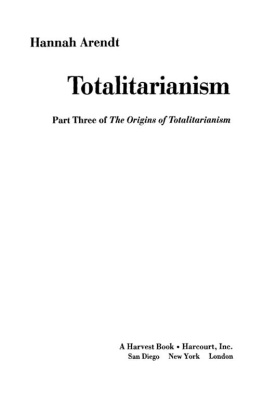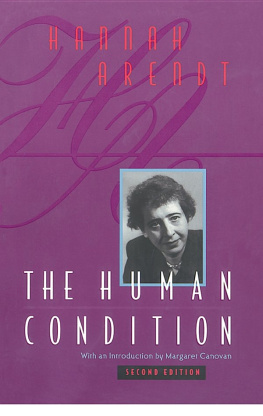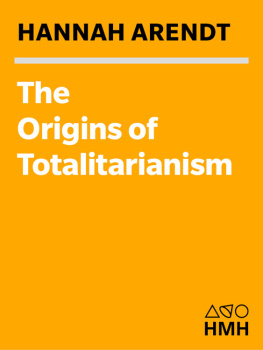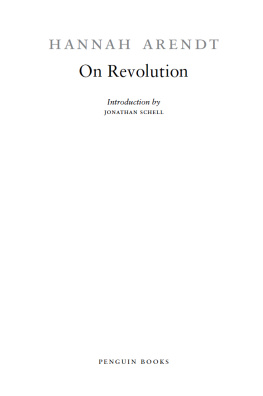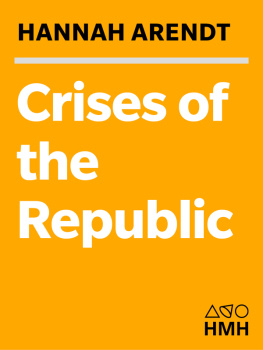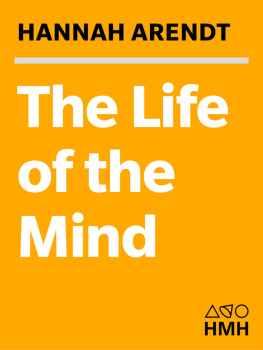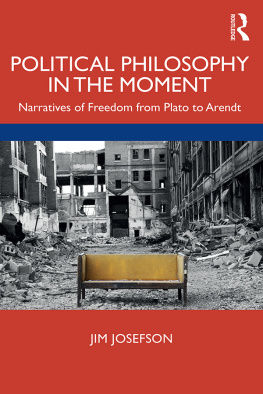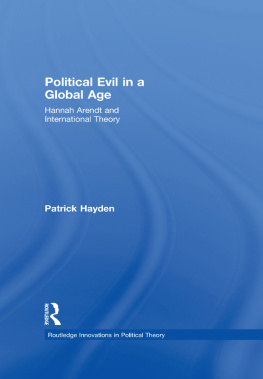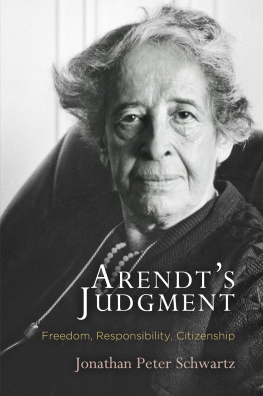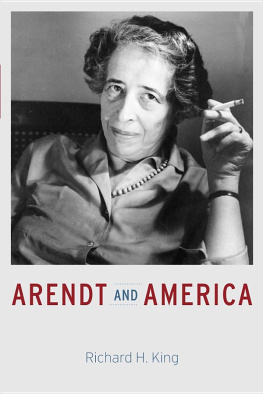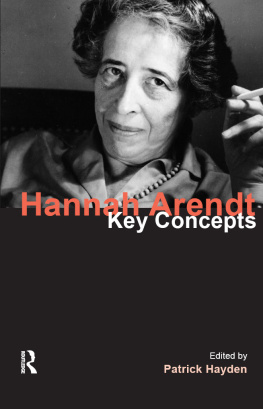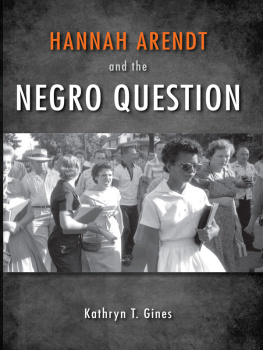Hannah Arendt - The Freedom to Be Free
Here you can read online Hannah Arendt - The Freedom to Be Free full text of the book (entire story) in english for free. Download pdf and epub, get meaning, cover and reviews about this ebook. year: 2018, publisher: Knopf Doubleday Publishing Group, genre: Politics. Description of the work, (preface) as well as reviews are available. Best literature library LitArk.com created for fans of good reading and offers a wide selection of genres:
Romance novel
Science fiction
Adventure
Detective
Science
History
Home and family
Prose
Art
Politics
Computer
Non-fiction
Religion
Business
Children
Humor
Choose a favorite category and find really read worthwhile books. Enjoy immersion in the world of imagination, feel the emotions of the characters or learn something new for yourself, make an fascinating discovery.

- Book:The Freedom to Be Free
- Author:
- Publisher:Knopf Doubleday Publishing Group
- Genre:
- Year:2018
- Rating:5 / 5
- Favourites:Add to favourites
- Your mark:
- 100
- 1
- 2
- 3
- 4
- 5
The Freedom to Be Free: summary, description and annotation
We offer to read an annotation, description, summary or preface (depends on what the author of the book "The Freedom to Be Free" wrote himself). If you haven't found the necessary information about the book — write in the comments, we will try to find it.
The Freedom to be Free was first published in Thinking Without a Banister, a varied collection of Arendts essays, lectures, reviews, interviews, speeches, and editorialswhich, taken together, manifest the relentless activity of her mind and character and contain within them the articulations of wide and sophisticated range of her political thought.
A Vintage Shorts Selection. An ebook short.
The Freedom to Be Free — read online for free the complete book (whole text) full work
Below is the text of the book, divided by pages. System saving the place of the last page read, allows you to conveniently read the book "The Freedom to Be Free" online for free, without having to search again every time where you left off. Put a bookmark, and you can go to the page where you finished reading at any time.
Font size:
Interval:
Bookmark:

Hannah Arendt
Hannah Arendt was raised in Knigsberg, in East Prussia, the city of Immanuel Kant. To Arendt, Kant was the clearest of all the great thinkers; she said she sensed him looking over her shoulder while she wrote. In 1933, as a Jew in Hitlers Germany, Arendt was briefly arrestedhappily not by the Gestapofor working with the Berlin Zionist organization. She escaped Germany and settled in Paris, where she worked with Youth Aliyah, an organization that enabled Jewish children, mainly from Eastern Europe, to go to Palestine. In Paris she became a friend to Walter Benjamin and married Heinrich Bluecher, who had also fled Germany, for political rather than racial or religious reasons.
After the German invasion of France in May 1940, Arendt was imprisoned in the Gurs Internment Camp as an enemy alien. She escaped when it was possible to do so; those who did not ended up in Auschwitz, shipped there under the direction of Adolf Eichmann. With visas provided by Hiram Bingham and funds from Varian Fry, Arendt and Bluecher traveled from France to Spain to Portugal and from there to New York City in 1941. After eighteen years of statelessness, she became an American citizen in 1951. Arendt taught at Notre Dame, Berkeley, Princeton, and Chicago, and, for the last seven years of her life, at the New School for Social Research. She died suddenly on December 4, 1975, at the age of sixty-nine. None of her books has ever gone out of print.
A LSO BY H ANNAH A RENDT
Nonfiction
Between Past and Future: Eight Exercises in Political Thought
Crises of the Republic
Eichmann in Jerusalem: A Report on the Banality of Evil
Essays in Understanding, 19301954
The Human Condition
The Jew as Pariah: Jewish Identity and Politics in the Modern Age
The Jewish Writings
Lectures on Kants Political Philosophy
The Life of the Mind, Vol. I Thinking, Vol. II Willing
Love and Saint Augustine
Men in Dark Times
On Revolution
On Violence
The Origins of Totalitarianism
The Promise of Politics
Rahel Varnhagen: The Life of a Jewish Woman
Responsibility and Judgment
Correspondence
Between Friends: The Correspondence of Hannah Arendt and Mary McCarthy, 19491975
Correspondence, 19261969 (with Karl Jaspers)
Letters, 19251975 (with Martin Heidegger)
Within Four Walls: The Correspondence Between Hannah Arendt and Heinrich Blcher, 19361968
The Freedom to Be Free
from Thinking Without a Banister
by Hannah Arendt
A Vintage Short
Vintage Books
A Division of Penguin Random House LLC
New York
Copyright 2018 by The Literary Trust of Hannah Arendt and Jerome Kohn
All rights reserved. Published in the United States by Vintage Books, a division of Penguin Random House LLC, New York, and in Canada by Random House of Canada, a division of Penguin Random House Canada Limited, Toronto. Originally published in hardcover the United States as part of Thinking Without a Banister by Schocken Books, a division of Penguin Random House LLC, New York, in 2018.
Vintage and colophon are registered trademarks of Penguin Random House LLC.
The Cataloging-in-Publication Data for Thinking Without a Banister is available from the Library of Congress.
Ebook ISBN9780525566595
Cover design by Linda Huang
www.vintagebooks.com
v5.3.2
a
My subject today, Im afraid, is almost embarrassingly topical. Revolutions have become everyday occurrences since, with the liquidation of imperialism, so many peoples have risen to assume among the powers of the earth the separate and equal station to which the laws of nature and natures God entitle them. Just as the most lasting result of imperialist expansion was the export of the idea of the nation-state to the four corners of the earth, so the end of imperialism under the pressure of nationalism has led to the dissemination of the idea of revolution all over the globe.
All these revolutions, no matter how violently anti-Western their rhetoric may be, stand under the sign of traditional Western revolutions. The current state of affairs was preceded by the series of revolutions after the First World War in Europe itself. Since then, and more markedly after the Second World War, nothing seems more certain than that a revolutionary change of the form of government, in distinction to an alteration of administration, will follow defeat in a war between the remaining powersshort, that is, of total annihilation. But it is important to note that even before technological developments made wars between the great powers literally a life-and-death struggle, hence self-defeating, politically speaking wars had already become a matter of life and death. This was by no means a matter of course, but signifies that the protagonists of national wars had begun to act as though they were involved in civil wars. And the small wars of the last twenty yearsKorea, Algeria, Vietnamhave clearly been civil wars, in which the great powers became involved, either because revolution threatened their rule or had created a dangerous power vacuum. In these instances it was no longer war that precipitated revolution; the initiative shifted from war to revolution, which in some cases, but by no means all, was followed by military intervention. It is as if we were suddenly back in the eighteenth century, when the American Revolution was followed by a war against England, and the French Revolution by a war against the allied royal powers of Europe.
And again, despite the enormously different circumstances technological and otherwisemilitary interventions appear relatively helpless in the face of the phenomenon. A large number of revolutions during the last two hundred years went to their doom, but relatively few were dissipated by superiority in the application of the means of violence. Conversely, military interventions, even when they were successful, have often proved remarkably inefficient in restoring stability and filling the power vacuum. Even victory seems unable to substitute stability for chaos, honesty for corruption, authority and trust in government for decay and disintegration. Restoration, the consequence of an interrupted revolution, usually provides not much more than a thin and quite obviously provisional cover under which the processes of disintegration continue unchecked. But there is, on the other hand, a great potential future stability inherent in consciously formed new political bodies, of which the American Republic is the prime example; the principal problem, of course, is the rarity of successful revolutions. Still, in the worlds present configuration where, for better or worse, revolutions have become the most significant and frequent eventsand this will most likely continue for decades to comeit would not only be wiser but also more relevant if, instead of boasting that we are the mightiest power on earth, we would say that we have enjoyed an extraordinary stability since the founding of our republic, and that this stability was the direct outgrowth of revolution. For, since it can no longer be decided by war, the contestation of the great powers may well be decided, in the long run, by which side better understands what revolutions are and what is at stake in them.
It is, I believe, a secret from nobody, at least not since the Bay of Pigs incident, that the foreign policy of this country has shown itself hardly expert or even knowledgeable in judging revolutionary situations or in understanding the momentum of revolutionary movements. Although the Bay of Pigs is often blamed on faulty information and malfunctioning secret services, the failure actually lies much deeper. The failure was in misunderstanding what it means when a poverty-stricken people in a backward country, in which corruption has reached the point of rottenness, are suddenly released, not from their poverty, but from the obscurity and hence incomprehensibility of their misery; what it means when they hear for the first time their condition being discussed in the open and find themselves invited to participate in that discussion; and what it means when they are brought to their capital, which they have never seen before, and told: these streets and these buildings and these squares, all these are yours, your possessions, and hence your pride. This, or something of the same sort, happened for the first time during the French Revolution. Curiously, it was an old man in East Prussia who never left his home town of Knigsberg, Immanuel Kant, a philosopher and lover of freedom hardly famous for rebellious thoughts, who at once did understand. He said that such a phenomenon in human history will never be forgotten, and indeed, it has not been forgotten but, on the contrary, has played a major role in world history ever since it occurred. And though many revolutions have ended in tyranny, it has also always been remembered that, in the words of Condorcet, The word revolutionary can be applied only to revolutions whose aim is freedom.
Font size:
Interval:
Bookmark:
Similar books «The Freedom to Be Free»
Look at similar books to The Freedom to Be Free. We have selected literature similar in name and meaning in the hope of providing readers with more options to find new, interesting, not yet read works.
Discussion, reviews of the book The Freedom to Be Free and just readers' own opinions. Leave your comments, write what you think about the work, its meaning or the main characters. Specify what exactly you liked and what you didn't like, and why you think so.

